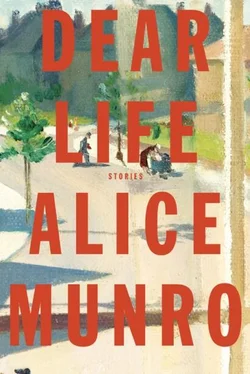Another idea. Isn’t it quite possible that this person—the crazy-doctor, as she has chosen to call him in her head—isn’t it quite possible that he (or she—like most people of her age she does not automatically allow for that possibility) that he or she does operate out of a house? It would make sense and be cheaper. You don’t need a lot of apparatus for the crazy doctoring.
So she continues her walk away from the main street. The doctor’s name that she is after has come back to her, as such things are apt to do when there is no longer a crisis. The houses she walks by were mostly built in the nineteenth century. Some of wood, some of brick. The brick ones often two full stories high, the wooden ones somewhat more modest, a story and a half with slanting ceilings in the upstairs rooms. Some front doors open just a few feet from the sidewalk. Others onto wide verandas, occasionally glassed in. A century ago, on an evening like this one, people would have been sitting on their verandas or perhaps on the front steps. Housewives who had finished washing the dishes and sweeping up the kitchen for the last time that day, men who had coiled up the hose after giving the grass a soaking. No garden furniture such as now sat here empty, showing off. Just the wooden steps or dragged-out kitchen chairs. Conversation about the weather or a runaway horse or some person who has taken to bed and was not expected to recover. Speculation about herself, once she was out of earshot.
But wouldn’t she have put their minds at ease by this time, stopping and asking them, Please, can you tell me, where is the doctor’s house?
New item of conversation. What does she want the doctor for?
(This once she has put herself out of earshot.)
Now every single person is inside with their fans on or their air-conditioning. Numbers on the houses appear, just as in a city. No sign of a doctor.
Where the sidewalk ends there is a large brick building with gables and a clock tower. Perhaps a school, before the children were bused to some larger and drearier center of learning. The hands stopped at twelve, for noon or midnight, which certainly is not the right time. Profusion of summer flowers that seem professionally arranged—some spilling out of a wheelbarrow and more out of a milk pail on its side. A sign she cannot read because the sun is shining straight onto it. She climbs up on the lawn to see it at another angle.
Funeral Home. Now she sees the built-on garage that probably holds the hearse.
Never mind. She had better get on with things.
She turns onto a side street where there are very well kept places indeed, proving that even a town this size can have its suburb. The houses all slightly different yet somehow looking all the same. Gently colored stone or pale brick, peaked or rounded windows, a rejection of the utilitarian look, the ranch style of past decades.
Here there are people. They haven’t all managed to shut themselves up with the air-conditioning. A boy is riding a bicycle, taking diagonal routes across the pavement. Something about his riding is odd, and she cannot figure it out at first.
He is riding backward. That’s what it is. A jacket flung in such a way that you could not see—or she cannot see—what is wrong.
A woman who might be too old to be his mother—but who is very trim and lively looking all the same—is standing out in the street watching him. She is holding on to a skipping rope and talking to a man who could not be her husband—both of them are being too cordial.
The street is a curved dead end. No going farther.
Interrupting the adults, Nancy excuses herself. She says that she is looking for a doctor.
“No, no,” she says. “Don’t be alarmed. Just his address. I thought you might know.”
Then comes the problem of realizing that she is still not sure of the name. They are too polite to show any surprise at this but they cannot help her.
The boy on one of his perverse sallies comes swinging around, barely missing all three.
Laughter. No reprimand. A perfect young savage and they seem to positively admire him. They all remark on the beauty of the evening, and Nancy turns to go back the way that she has come.
Except that she does not go all the way, not as far as the funeral home. There is a side street she ignored before, perhaps because it was unpaved and she had not thought of a doctor living in such circumstances.
There is no sidewalk, and the houses are surrounded with trash. A couple of men are busy under the hood of a truck, and she has an idea it would not do to interrupt them. Besides, she has glimpsed something interesting ahead.
There is a hedge that comes right out to the street. It is high enough that she does not expect to be able to see over it, but thinks she might be able to peek through.
That is not necessary. When she gets past the hedge she finds that the lot—about the size of four town lots—is quite open to the road she is walking on. It appears to be some sort of park, with flagstone paths diagonally crossing the mown and flourishing grass. In between the paths, and bursting from the grass, there are flowers. She knows some of them—the dark gold and light yellow daisies for instance, pink and rosy and red-hearted white phlox—but she is no great gardener herself and here there are clumped or trailing displays of all colors that she could not name. Some of them climb trellises, some spread free. Everything artful but nothing stiff, not even the fountain that shoots up seven feet or so before falling down into its rock-lined pool. She has walked in off the street to get a little of its cool spray, and there she finds a wrought-iron bench, where she can sit down.
A man has come along one of the paths, carrying a pair of shears. Gardeners are evidently expected to work late here. Though to tell the truth, he does not look like a hired workman. He is tall and very thin and dressed in a black shirt and pants that tightly fit his body.
It has not occurred to her that this could be anything but a town park.
“This is really beautiful,” she calls to him in her most assured and approving voice. “You keep it up so well.”
“Thank you,” he says. “You’re welcome to rest there.”
Informing her by some dryness of voice that this is not a park but private property, and that he himself is not a village employee but the owner.
“I should have asked your permission.”
“That’s okay.”
Preoccupied, bending and snipping at a plant that is encroaching on the path.
“It’s yours, is it? All of it?”
After a moment’s busyness, “All of it.”
“I should have known. It’s too imaginative to be public. Too unusual.”
No answer. She is going to ask him whether he likes to sit here himself, in the evenings. But she better not bother. He doesn’t seem an easy person to be around. One of those who pride themselves, probably, on that very fact. After a moment she will thank him and get up.
But instead, after a moment he comes and sits down beside her. He speaks just as if a question has been put to him.
“Actually, I only feel comfortable when I’m doing something that needs attending to,” he says. “If I sit down I have to keep my eyes off everything, or I’ll just see some more work.”
She should have known right away that he was a man who doesn’t like banter. But still she is curious.
What was here before?
Before he made the garden?
“A knitting factory. All these little places had something like that, you could get away with the starvation wages then. But in time that went under and there was a contractor who thought he was going to turn it into a nursing home. There was some trouble then, the town wouldn’t give him a license, they had some idea there’d be a lot of old people around and make it depressing. So he set fire to it or he knocked it down, I don’t know.”
Читать дальше












